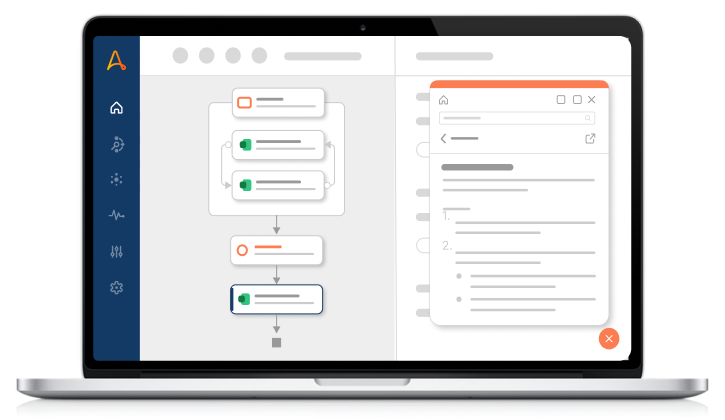Automate and coordinate complex work
Goal-driven AI agents, powered by the Process Reasoning Engine (PRE), handle reasoning, human-in-the-loop, and orchestrate across bots, APIs, documents—and other agents—in real time.
Learn from data and adapt
Built on the right foundational model for your use case, grounded in your company data, AI agents can learn, action, and adjust as needed.
Do even more with AI teamwork
Autonomous AI agents work together across the most important processes in every department—with your models, your applications, and your environments.
Keep it secure, private, and safe
See what goes in and comes out of your AI models so you can be sure everything is in line with privacy, compliance, and responsible AI rules and regulations.
Your AI agents. Your way.
- Create goal-driven agents tailored to your business. Assign each one a specific role, goal, and tool access to deliver on desired outcomes.
- Choose your LLM, connect your data, and customize easily using templates or your own prompts.
- Orchestrate agents easily within end-to-end workflows via drag-and-drop tools with AI-powered next action suggestions.
- Monitor every move agents make. Built-in governance and guardrails keep AI actions clear, safe, and accountable.

100%
of invoices analyzed for tax accuracy
Zero
tax overpayments
$1M
in automation value within year-1
The Washington Post Harnesses Agentic AI
The Washington Post implemented Agentic AI to read, extract, and analyze tax billed on payable invoices. By deploying an AI Agent powered by its proprietary LLMs, the company gained the capacity to validate and issue tax corrections on 100% of invoices.
How does AI Agent Studio work?
Make it simple for diverse automation teams to set up AI agents and stay safe and secure. Take your pick of AI model, tune prompts, share templates, and plug AI agents into workflows—with 100% oversight.
- Select and connect
- Tune and test
- Templatize
- Plug in to workflows
- Monitor and audit
Select and connect
Choose an AI model from your approved list and connect it to your data. Test different models to see which is the best fit.

Tune and test
Adjust prompts to meet your exact requirements and test for accuracy.

Templatize
Save prompts as templates for quick access for future workflows.

Plug in to workflows
Drag and drop your optimized AI prompts—AI agents—into automation workflows.

Monitor and audit
Keep tabs on everything for accuracy and to protect sensitive information.

Frequently asked questions
What skills or technical expertise are required to create AI agents with AI Agent Studio?
AI Agent Studio is a low-code workspace for creating AI agents. Having a good understanding of AI governance and generative AI models, and integrating them into automations is helpful in creating effective AI agents with AI Agent Studio.
What types of tasks or processes can the AI agents created in AI Agent Studio perform?
AI Agent Studio equips automation developers to build powerful goal-based AI agents that can automate complicated tasks that would normally require human attention. These agents can reason, get work done, and make informed decisions across business systems.
That means AI agents made in AI Agent Studio can do all kinds of different jobs like providing a product replacement recommendation, pulling information from documents, checking if workflows follow compliance rules, figuring out credit scores, answering customer questions, and analyzing financial data.
Using AI Agent Studio, you can create reusable skills for AI agents. For example, an AI agent to support customer service teams would have skills to accomplish tasks like categorizing inquiry priority and updating inventory management systems. Putting AI skills together makes it possible for AI agents to think, make decisions, adjust to new situations, and work through tasks without needing humans all the time.
Can AI Agent Studio support custom AI models or integrations with third-party AI platforms?
Yes, AI Agent Studio supports custom AI models and integrations with third-party AI platforms. It allows developers to start with foundational models from major cloud platforms like AWS, Google Cloud, and Microsoft Azure OpenAI. Developers can also bring their own AI models to integrate with the platform, making it flexible to match enterprise needs.
What types of data can be processed by AI agents created with AI Agent Studio?
AI agents created with AI Agent Studio can process any data that can be integrated into automated workflows. They are designed to handle both structured and unstructured data, for example, text data from documents, financial records, customer service inquiries, and compliance information.
Does AI Agent Studio allow collaboration between multiple users or teams during the agent development process?
Yes, AI Agent Studio lets different people or teams work together while creating AI agents. It has tools and features that allow multiple users to build, manage, and improve AI agents together, making it easy for everyone to collaborate.
What is the typical development time for creating an AI agent in AI Agent Studio?
Typically, you can make a first version of an AI agent in a matter of days. But it’s important to note that the time it takes to create an AI agent in AI Agent Studio will vary based on how complex the agent is and what the specific needs are for your project. Because AI Agent Studio has low-code tools and templates, it lets you build AI agents quickly.
How does AI Agent Studio ensure AI agents don’t take unauthorized actions?
AI Guardrails are Automation Anywhere’s built-in safety and governance layer for AI Agent Studio. They help you keep AI behavior safe, compliant, and aligned with your policies by blocking unsafe actions before they happen.
Guardrails can perform critical safety checks in real time. For example, they can automatically find and mask sensitive data like PII or PCI information in a user's prompt, analyze language for toxicity and block harmful requests from ever reaching the LLM, or even block an inappropriate response generated by the model before the user sees it. All of these actions are logged to provide a complete audit trail for governance and compliance.
By using an inline interception mechanism, AI Guardrails allow you to define and enforce your company's specific AI usage policies. This active approach to monitoring, filtering, and blocking content enhances safety, helps with regulatory compliance, and proactively mitigates risks, ultimately building greater trust in your AI systems.
Source: https://docs.automationanywhere.com/bundle/enterprise-v2019/page/ai-guardrail.html
How does AI Agent Studio ensure auditability and traceability for every decision and action an agent takes?
Every decision, step, and response from your AI agents is tracked automatically. AI Agent Studio’s AI Governance capabilities give you a full activity log, so you can see what each agent did, when it did it, and why.
For every automation that runs, AI Governance captures detailed information in two primary logs. The AI prompt log provides a consolidated summary of each session, recording the user, the automation name, the full text of the prompt sent to the model, and the complete response received. The Event log offers a more granular, step-by-step view, tracking the status (success or failure) of specific events like establishing a model connection or triggering an AI Skill.
This comprehensive logging allows for deep traceability. Users with the right permissions can drill down into any session using its unique Session ID to investigate every single model interaction, including which AI Guardrails were applied and the toxicity scores of both prompts and responses. This data can also be exported to external security (SIEM) platforms, allowing you to proactively monitor for policy compliance and maintain a defensible record of all AI activity.
Source: https://docs.automationanywhere.com/bundle/enterprise-v2019/page/ai-gov-overview.html
What are AI Skills in the AI Agent Studio?
AI Skills are reusable, modular components that let you add AI-powered actions to your automations, without writing complex code. They connect to leading AI models and handle tasks like summarizing text, classifying emails, or extracting data.
For example, a developer can create an AI Skill for a specific business need, such as performing sentiment analysis to categorize incoming customer emails. Once that skill is published, a citizen developer can easily find it and use it in their own automation to route the emails to the correct department, all without writing any complex AI-related code.
The primary benefits of AI Skills are reusability and broad connectivity. A single skill can be used consistently across many different automations, saving development time. Skills can connect to a wide range of models from providers like Google Vertex AI, Azure OpenAI, and Amazon Bedrock, and can even be "grounded" with your company's own knowledge bases to provide more accurate and contextually relevant responses.
Source: https://docs.automationanywhere.com/bundle/enterprise-v2019/page/ai-skills.html
Does AI Agent Studio provide foundational models directly?
No, AI Agent Studio doesn’t host its own models. Instead, it lets you securely connect to leading foundational models from vendors like Amazon Bedrock, Google Vertex AI, Azure OpenAI, and OpenAI.
Currently, Automation Anywhere supports standard, fine-tuned, and RAG foundational models from hyperscaler vendors such as Amazon Bedrock, Google Vertex AI, Azure OpenAI, OpenAI and others. These are standard and fine-tuned models supported for each vendor:
- Amazon Bedrock: anthropic.claude-v2:1, amazon.titan-text-express-v1, amazon.titan-text-lite-v1, Anthropic Claude 3.5 Sonnet.
- Google Vertex AI: text-unicorn, text-bison, text-bison-32k, gemini-1.0-pro, Gemini 1.5 Flash, Anthropic Claude 3.5 Sonnet.
- Azure OpenAI: gpt-4, gpt-4-32k, gpt-35-turbo, gpt-35-turbo-16k, GPT-4o, GPT-4o mini.
- OpenAI: gpt-4, gpt-4-turbo-preview, gpt-3.5-turbo, gpt-3.5-turbo-16k, GPT-4o, GPT-4o mini.
And these are RAG models supported for each vendor:
- Amazon Bedrock: Amazon Titan Text Premier, Anthropic Claude v2.1, Anthropic Claude Instant v1, Anthropic Claude v2.0, Anthropic Claude 3 Sonnet v1 and Anthropic Claude 3 Haiku v1 .
- Google Vertex AI: Gemini 1.0 Pro 1, Gemini 1.0 Pro 2 and Gemini 1.5 Flash 1.
- Automation Anywhere: Supports all foundational models that Enterprise Knowledge supports.
Source: https://docs.automationanywhere.com/bundle/enterprise-v2019/page/ai-studio-faq.html
What are Grounded Models in AI Agent Studio?
Grounded Models are AI models in AI Agent Studio that give answers based on your company’s own data. They use a technique called Retrieval Augmented Generation (RAG) to search through your trusted sources, like documents stored in an Amazon Knowledge Base or Google Data Store, and pull in information before generating a response.
For example, you could create a knowledge base containing your company's internal documents, like tax rule PDFs for different years. When you use a grounded model to ask a question such as, "What was the gift tax limit for 2024?", the system first retrieves the relevant document and uses that specific information to formulate the correct answer.
Grounding prevents response inaccuracies and model hallucinations by forcing the AI to base its answers on your provided data. To ensure transparency, the model's response includes Citations that show the exact chunks of information from your source documents that were used, allowing you to easily verify the accuracy of every answer.
Get to know AI Agent Studio

For Students & Developers
Start automating instantly with FREE access to full-featured automation with Cloud Community Edition.


